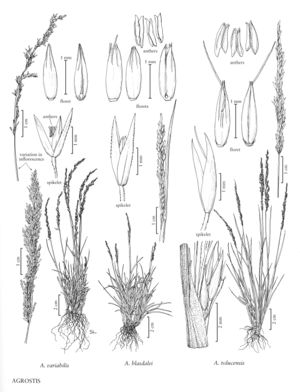Difference between revisions of "Agrostis variabilis"
FNA>Volume Importer |
FNA>Volume Importer |
||
| Line 17: | Line 17: | ||
-->{{Treatment/Body | -->{{Treatment/Body | ||
|distribution=Colo.;N.Mex.;Wash.;Utah;Alta.;B.C.;Idaho;Mont.;Wyo.;Calif.;Nev.;Oreg. | |distribution=Colo.;N.Mex.;Wash.;Utah;Alta.;B.C.;Idaho;Mont.;Wyo.;Calif.;Nev.;Oreg. | ||
| − | |discussion=<p>Agrostis variabilis grows in alpine and subalpine meadows and forests and on talus slopes, at elevations up to 4000 m, from British Columbia and Alberta south to California and New Mexico. It can appear similar to dwarf forms of Podagrostis humilis (p. 694), but differs from that species in not having paleas.</p> | + | |discussion=<p><i>Agrostis variabilis</i> grows in alpine and subalpine meadows and forests and on talus slopes, at elevations up to 4000 m, from British Columbia and Alberta south to California and New Mexico. It can appear similar to dwarf forms of <i>Podagrostis humilis</i> (p. 694), but differs from that species in not having paleas.</p> |
|tables= | |tables= | ||
|references= | |references= | ||
| Line 38: | Line 38: | ||
|publication year= | |publication year= | ||
|special status= | |special status= | ||
| − | |source xml=https://jpend@bitbucket.org/aafc-mbb/fna-data-curation.git/src/ | + | |source xml=https://jpend@bitbucket.org/aafc-mbb/fna-data-curation.git/src/8f726806613d60c220dc4493de13607dd3150896/coarse_grained_fna_xml/V24/V24_924.xml |
|subfamily=Poaceae subfam. Pooideae | |subfamily=Poaceae subfam. Pooideae | ||
|tribe=Poaceae tribe Poeae | |tribe=Poaceae tribe Poeae | ||
Revision as of 17:23, 18 September 2019
Plants perennial; cespitose, rarely rhizomatous, rhizomes to 2 cm. Culms 5-30 cm, erect, sometimes geniculate at the base, with 2-5(7) nodes. Leaves mostly basal, forming dense tufts; sheaths smooth; ligules (0.7)1-2.8 mm, dorsal surfaces usually scabridulous, sometimes smooth, apices rounded to truncate, lacerate to erose; blades 3-7 cm long, 0.5-2 mm wide, flat, becoming folded or involute. Panicles (1)2.5-6 cm long, 0.3-1.2(2) cm wide, cylindric to lanceolate, usually dense, exserted from the upper sheaths at maturity, lowest node with 1-5 branches; branches usually scabridulous, sometimes smooth, ascending to erect, branching at or near the base and spikelet-bearing to the base, to branching in the distal 2/3, lower branches 0.5-1.5 cm; pedicels 0.4-2.8(4.3) mm. Spikelets ovate to lanceolate, greenish purple. Glumes subequal to equal, 1.8-2.5 mm, smooth, or scabrous on the keel and sometimes elsewhere, 1-veined, acute to acuminate; callus hairs to 0.2 mm, sparse to abundant; lemmas 1.5-2 mm, smooth, translucent, (3)5-veined, veins usually prominent distally, sometimes obscure throughout, apices acute, entire, usually unawned, rarely awned, awns to 1(2.8) mm, arising beyond the midpoint, usually not reaching the lemma apices; paleas to 0.2 mm, thin; anthers 3, 0.4-0.7(1) mm. Caryopses 1-1.3 mm; endosperm soft. 2n = 28.
Distribution
Colo., N.Mex., Wash., Utah, Alta., B.C., Idaho, Mont., Wyo., Calif., Nev., Oreg.
Discussion
Agrostis variabilis grows in alpine and subalpine meadows and forests and on talus slopes, at elevations up to 4000 m, from British Columbia and Alberta south to California and New Mexico. It can appear similar to dwarf forms of Podagrostis humilis (p. 694), but differs from that species in not having paleas.
Selected References
None.
